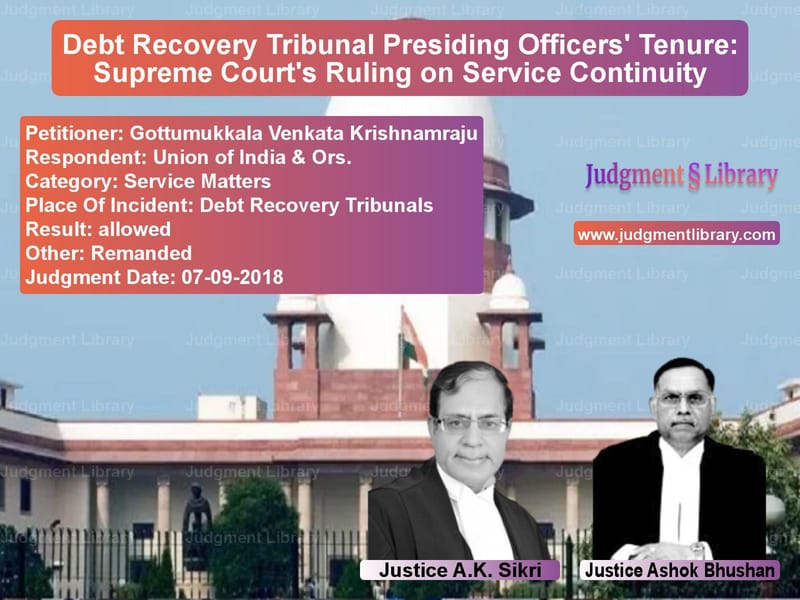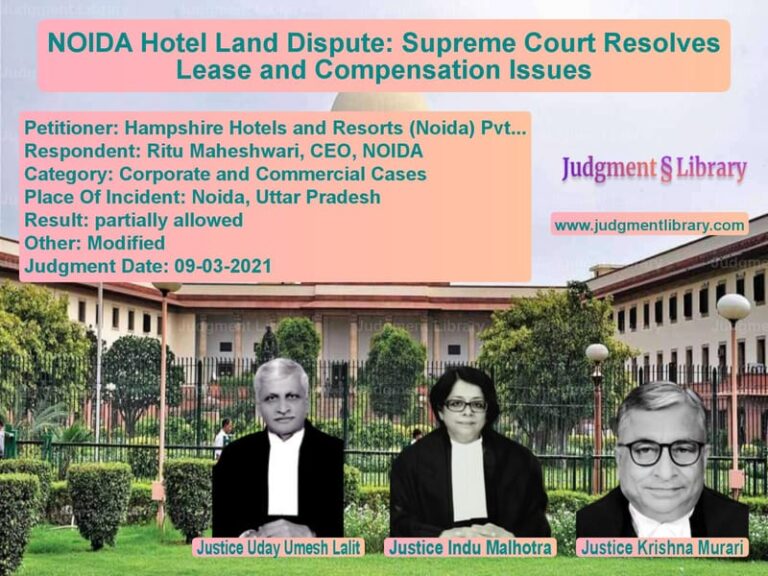Debt Recovery Tribunal Presiding Officers’ Tenure: Supreme Court’s Ruling on Service Continuity
The Supreme Court’s judgment in Gottumukkala Venkata Krishnamraju vs. Union of India & Ors., delivered on September 7, 2018, addressed a crucial issue regarding the tenure and retirement age of Presiding Officers of the Debt Recovery Tribunals (DRTs). The case revolved around whether the amendment to Section 6 of the Recovery of Debts and Bankruptcy Act, 1993, which extended the retirement age from 62 years to 65 years, should apply retrospectively to officers who were already in service before the amendment.
Background of the Case
The petitioners in the case were appointed as Presiding Officers of Debt Recovery Tribunals under the Recovery of Debts Due to Banks and Financial Institutions Act, 1993 (now known as the Recovery of Debts and Bankruptcy Act, 1993). According to the pre-amended Section 6 of the Act:
- A Presiding Officer could hold office for a term of five years or until the age of 62 years, whichever was earlier.
However, following amendments introduced through the Finance Act, 2017, the tenure was revised as follows:
- The retirement age was increased to 65 years.
- Presiding Officers would now be eligible for reappointment.
The key question before the Supreme Court was whether the revised provisions should apply to officers who had already been appointed before the amendment but had not yet completed their five-year tenure.
Petitioners’ Arguments
The petitioners argued that:
- The amendment to Section 6 substituted the old provision rather than merely amending it. This substitution meant that the earlier retirement rule no longer existed and that all serving officers should benefit from the new rule.
- The legislative intent behind the amendment was to reduce case pendency in DRTs by ensuring continuity in service, which would be defeated if existing officers were forced to retire at 62.
- Legal precedent supported a purposive interpretation of the law, which should allow current officers to continue in service until 65.
- The amended Section 6 did not include any clause limiting its application to new appointees, meaning it should apply universally to all Presiding Officers.
Union of India’s Arguments
The Union of India, represented by the Additional Solicitor General (ASG), countered that:
- The amendment was intended to apply prospectively, meaning it should only benefit those appointed after the amendment came into force on September 1, 2016.
- The previous rule had clearly stated that officers would retire at 62 unless they had completed their five-year tenure. No right to an extended tenure could be claimed based on the amendment.
- Extending the tenure of existing officers would hinder fresh appointments and the infusion of “young blood” into the system.
- In legal matters, retrospective application of amendments should only be considered when explicitly stated by the legislature, which was not the case here.
Supreme Court’s Observations
The Supreme Court, after examining the arguments, ruled in favor of the petitioners. Key observations included:
- On substitution vs. amendment: The Court emphasized that when a law is “substituted,” it replaces the earlier provision completely. The amended Section 6, therefore, was meant to replace the old rule entirely.
- On legislative intent: The Court referred to parliamentary discussions and reports that highlighted the purpose of extending the retirement age—to address backlog in DRTs. Denying this benefit to existing officers would defeat this objective.
- On fairness and continuity: Officers who were already serving should not be deprived of the benefit of an extended tenure, as they had been appointed under the same legislative framework that had now been amended.
- On legal precedents: The Court cited previous judgments where amendments were applied to serving officers based on a purposive interpretation of the law.
Final Judgment
The Supreme Court ruled that:
- All Presiding Officers serving as of September 1, 2016, would be entitled to continue in service until the age of 65 or until they completed five years of tenure, whichever came earlier.
- The petitioners were entitled to reinstatement with full benefits, including salary for the intervening period.
- The Government must ensure compliance with this ruling to prevent further legal disputes on the matter.
Implications of the Judgment
This ruling has several important implications for service matters, particularly in judicial and quasi-judicial appointments:
- Ensuring consistency in service rules: The judgment clarifies that when an amendment substitutes an earlier provision, it applies universally unless specifically restricted.
- Reducing backlog in DRTs: By allowing experienced officers to continue in service, the ruling helps maintain judicial continuity and reduces disruptions in the disposal of cases.
- Strengthening judicial fairness: The Court reinforced the principle that amendments meant to improve governance should benefit existing officers unless there is a clear legislative intent to exclude them.
Overall, the Supreme Court’s decision reinforced the principle that procedural fairness and legislative intent must guide service-related amendments, ensuring that those already serving under an older framework are not unfairly disadvantaged.
Petitioner Name: Gottumukkala Venkata Krishnamraju.Respondent Name: Union of India & Ors..Judgment By: Justice A.K. Sikri, Justice Ashok Bhushan.Place Of Incident: Debt Recovery Tribunals.Judgment Date: 07-09-2018.
Don’t miss out on the full details! Download the complete judgment in PDF format below and gain valuable insights instantly!
Download Judgment: Gottumukkala Venkata vs Union of India & Ors Supreme Court of India Judgment Dated 07-09-2018.pdf
Direct Downlaod Judgment: Direct downlaod this Judgment
See all petitions in Employment Disputes
See all petitions in Recruitment Policies
See all petitions in Public Sector Employees
See all petitions in Judgment by A.K. Sikri
See all petitions in Judgment by Ashok Bhushan
See all petitions in allowed
See all petitions in Remanded
See all petitions in supreme court of India judgments September 2018
See all petitions in 2018 judgments
See all posts in Service Matters Category
See all allowed petitions in Service Matters Category
See all Dismissed petitions in Service Matters Category
See all partially allowed petitions in Service Matters Category







